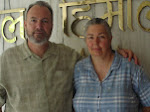38I sent you to reap that whereon ye bestowed no labour: other men laboured, and ye are entered into their labours.
Commentary: The disciples had a chance to see far beyond the physical farmland. Some laborers will harvest without having to sow because before their time others sowed and did not harvest. And some believers will never make the effort for harvesting we are can be strenuous work. Wind in the House of Islam.
39And many of the Samaritans of that city believed on him for the saying of the woman, which testified, He told me all that ever I did.
Commentary: The Samaritan woman harvested out from her testimony. Remember she left her water pot maybe she too was willing to forgo natural thirst for the spiritual. She just told it the way she saw and experienced it. God needs no help from us making up things to make Him seem bigger, braver, smarter, just tell the truth and the hearer will receive faith.
40So when the Samaritans were come unto him, they besought him that he would tarry with them: and he abode there two days.
Commentary: The more the town folks talked with Jesus and listened the more they discovered about Him. They were thrilled with Jesus and asked Him to take up permanent residency. Jesus will always stay where He is desired. The people Jesus visited again and again were people who desired His presence in their home. If we build Jesus a home He will dwell there.
41And many more believed because of his own word;
Commentary: Jesus had a ability to communicate the woman did not have. He spoke only those words that the Father told Him to and had the Spirit without measure. So too in our lives if we speak and are filled like Jesus.
42And said unto the woman, Now we believe, not because of thy saying: for we have heard him ourselves, and know that this is indeed the Christ, the Saviour of the world.
Commentary: The wealth of truth the woman did not have to give the people was discovered in Jesus. They were convinced by the word not by tricks or gimmicks. Personal conviction must not be based on another's conviction. A believer can stand more firmly upon what they know than upon what another believer knows.
43Now after two days he departed thence, and went into Galilee.
Commentary: The harvest was based on witnessing and not signs and wonders as the Jewish people want. Therefore, it is written "after two days" two being the number of witness. It was the will of the Father for Jesus to go to Sychar, but not to spend a lot of time there. One would think He would take up permanent quarters, but no. God usually moves one when things are going great. If we live to get we have failed. If we live to give grace characterizes our life and we are endeared to many.
44For Jesus himself testified, that a prophet hath no honour in his own country.
Commentary: When Jesus started His ministry, He left for Galilee because He was not welcomed in Nazareth. A minister must have a place where their message is received. A pastor must have a receptive congregation or he will be ousted. Nazareth treated Him like Jerusalem there was no room for Him.
45Then when he was come into Galilee, the Galileans received him, having seen all the things that he did at Jerusalem at the feast: for they also went unto the feast.
Commentary: The perception of the Galileans had at the feast became the foundation for the acceptance of Jesus in their own country. Unlike the Samaritans the Galileans accepted Jesus based on what he did rather than what He said. For the fulfillment of the word Jesus had to go to Galilee.
46So Jesus came again into Cana of Galilee, where he made the water wine. A certain nobleman, whose son was sick at Capernaum.
Commentary: Remember the first trip Jesus promised to bring joy (new wine) back to the Jewish people and not Israel. The servants (not the rich folks) remembered what He had done so His message would be well received. Maybe He would do twice as much this trip. Opportunity knocked twice.
47When he heard that Jesus was come out of Judaea into Galilee, he went unto him, and besought him that he would come down, and heal his son: for he was at the point of death.
Commentary: The talk of the town was what Jesus did in Jerusalem instead of His last trip to Cana. But a successful ministry inspires hope. We are not sure if the servant was a Jew or Gentile, it did not matter, (black, white brown, green) it does not matter, Jesus did not hesitate to meet the need (just like the first miracle) if the man was a Gentile. Jesus was sent to the Jews.

